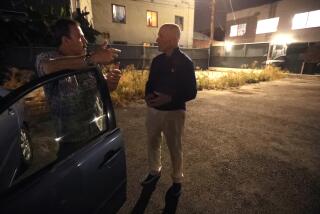‘Why are you poor?’
THE prolific writer William T. Vollmann once traveled to the Arctic, nearly freezing to death, to know what it was like to feel cold and hungry. He smoked crack cocaine with prostitutes to hear their true-blue tales. He survived a mine explosion in a Balkan war zone, with a close friend and another man dying in the Jeep he was sitting in. He authored a 3,300-page treatise, “Rising Up and Rising Down,” which examined various forms of violence, applying them to a moral compass.
These rugged credentials suggest the right author for a book on poverty. But “Poor People,” which has the comparatively well-off Vollmann compiling his conversations with the downtrodden, is fragmentary and often contradictory in tone, much like poverty itself. In his book’s “dictionary” section, Vollmann defines being “poor” as “lacking and desirous of what I have; unhappy in his or her own normality.” But Vollmann, traveling to Thailand, the Philippines, Russia and several other nations, never quite pinpoints a norm. He styles his own “phenomena” of poverty as an alternative to the United Nations’ “dimensions of poverty.” But if Vollmann wishes to take the U.N. to task, a book composed largely of anecdotes and meditative banter may not be the best way to do so.
The book (as Vollmann avers) is not “a companion monument to ‘Das Kapital,’ ” although Marx is dutifully cited throughout. Nor does it offer any clear solutions to poverty, despite a helpful income table that offers international rankings and stacks foreign currencies against the U.S. dollar. The book possesses something of a structure, with Vollmann framing his adventures within itemized perceptions and hopes, substituting his photographs for verbal millefiori and practicing his eager cross-referencing.
But he digresses more than he pinpoints. His semantics shift as frequently as the countries he visits. He offers a bold statement (“[P]overty is never political”), only to uproot it chapters later with a telltale parable of how postwar Stalinism diminished a hard-working family. The one constant within this curious miasma is the question that Vollmann posed to each of his subjects: “Why are you poor?” Answers range from denial to blaming Allah.
This is not to suggest that Vollmann lacks observational insight. His clear empathy for the vanquished and misunderstood compels him to record the specific circumstances that entrap them. Examples include an Imperial County, Calif., squatter financially crippled by a ticket for a cracked windshield, and Chinese B-girls who were ensnared into prostitution to pay for their Japanese visas.
Vollmann frequently uses cultural disparities to subvert perceptions about poverty. He talks with a Muslim in Taliban Afghanistan in 2000 who boasts that American men use their women “like tissue paper,” whereas the Muslim can “respect” a woman in his culture because it also keeps her in a hijab. Vollmann judges this gender subjugation preferable to South Africa’s former apartheid, because the Taliban system, in his view, is “an accidental result of fanatical literalism.” While this seems a needlessly provocative comparison, Vollmann does have a point about visible segregation, however ignoble, being better than the occasionally less obvious practices of an affluent society.
Vollman also contemplates the consequences of corporate greed, as in an oil town in Kazakhstan where the locals breathe poisonous sulfur fumes that kill them. As he puts it, “No doubt, in my ignorance of the ‘necessary’ ‘realities’ of oil extraction, about the virtues of America’s God-given right to drive to the shopping mall, about the altruistic statesmanship and incidental greed of Kazakhstan’s politicians, I am misconstruing all this.”
Elsewhere, however, he is naive about his subjects. Of a Thai cleaning woman, he suggests that “she might never have toiled and drunk her life away” had a small-scale agricultural industry existed to save her. But as David K. Shipler showed in his book “The Working Poor,” stable jobs alone are not a panacea. While Vollmann confesses that his “rich and intellectual friends are happy and sad,” it’s disingenuous to ignore psychological makeup when considering the impoverished.
There’s also the question of how much we can trust Vollmann’s stories. His fiction has frequently included a narrative alter ego, inspired by Poe and Lautreamont, who guides the reader into grimy underworlds, thus establishing an implicit trust between reader and author. Novelist Madison Smartt Bell once identified this tic of Vollman’s as a “quest for ocular proof” that bolstered Vollmann’s narrative integrity. In abandoning this device in “Poor People,” Vollmann embarks on a sloppier, more myopic journey. Although meticulous in logging details of almost all his travels, he is conspicuously silent about his sources as he describes a visit to a Times Square transient hotel. There are no photos or footnotes to this episode. Vollmann uses the anecdote to conclude: “Every man is rich or poor to the degree in which he can afford to enjoy the necessaries, conveniencies, and amusements of human life.” Fair enough, but this doesn’t explain why these people live in such squalor.
One must also raise a mildly cautious eyebrow over Vollmann’s interview methods, which involve paying his subjects. He’s defensive about this in a footnote, writing: “That’s right! I was paying for them; I was rich! Didn’t that give my invasiveness carte blanche?” But the more interesting issue is whether this guilt has affected Vollmann’s judgment. Although he confesses to being “amused and annoyed” by a Bangkok beggar whom he discovered was pretending to be armless, he “continued to pay his tithe, and with a cheerful heart.”
In the book’s most compelling section, Vollmann (who calls himself “a petty-bourgeois property owner”) describes his own experience with vagrants congregating near his property. He lets down his guard, beginning the chapter with the candid confession, “I am sometimes afraid of poor people.” He attempts to treat these interlopers as equals but soon discovers that they cannot respect his space. When he cracks his sealed windows open for some fresh air, he discovers the vagrants tampering with his blinds and ends up welding steel mesh over the windows.
While Vollmann is willing to confess these hesitations, what he cannot come to terms with are the origin points of his empathy. He is happy to reveal taxonomies and speculation, but if he believes that the poor are invisible and unwanted, then why not dare to suggest how his empathy can be spread?
Near the end of the book, he makes a try. “Reader, who are you?” he asks and then sets out to browbeat us into sharing his guilt. Does not a serious discussion about poverty go beyond fitting personal observations into neat categories? Poverty’s complexities demand more, particularly from such an important author. *
More to Read
Sign up for our Book Club newsletter
Get the latest news, events and more from the Los Angeles Times Book Club, and help us get L.A. reading and talking.
You may occasionally receive promotional content from the Los Angeles Times.






